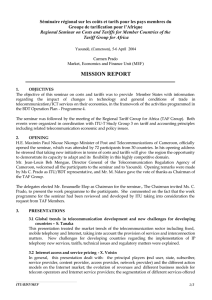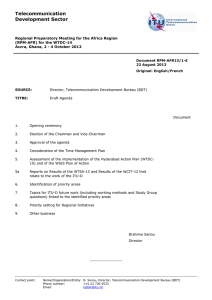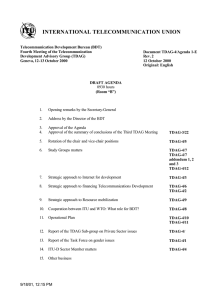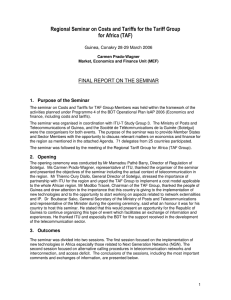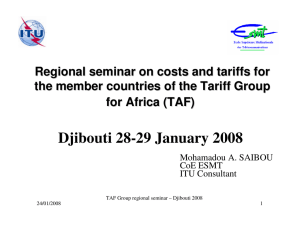Regional Seminar on Costs and Tariffs for Member Countries F
advertisement
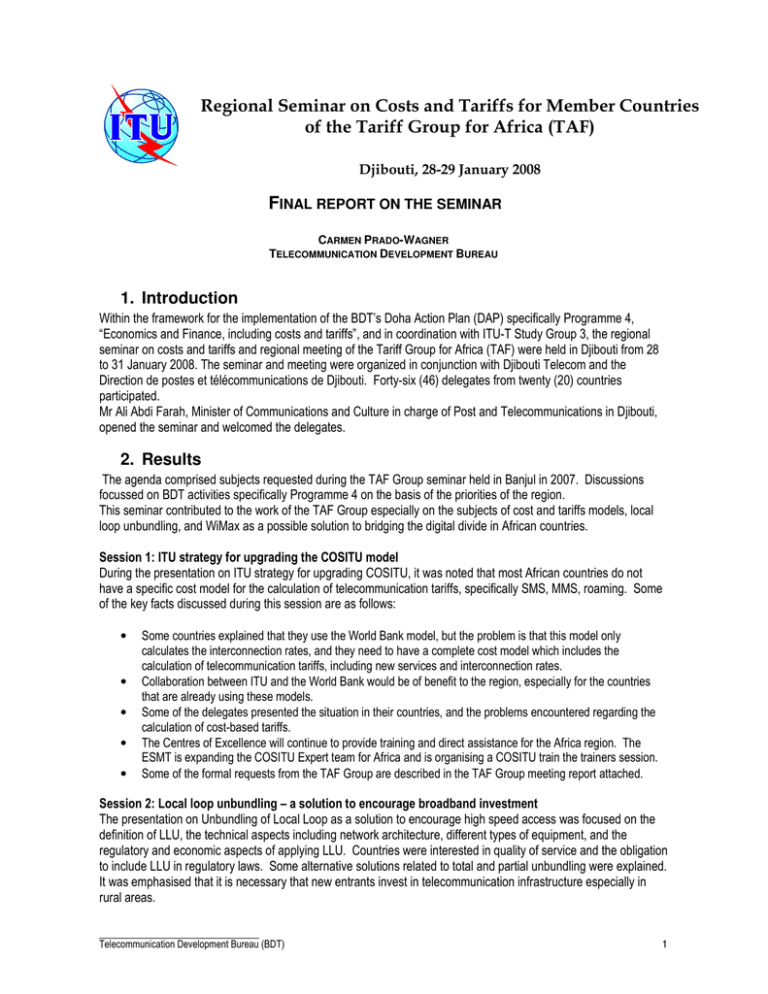
Regional Seminar on Costs and Tariffs for Member Countries of the Tariff Group for Africa (TAF) Djibouti, 28-29 January 2008 FINAL REPORT ON THE SEMINAR CARMEN PRADO-WAGNER TELECOMMUNICATION DEVELOPMENT BUREAU 1. Introduction Within the framework for the implementation of the BDT’s Doha Action Plan (DAP) specifically Programme 4, “Economics and Finance, including costs and tariffs”, and in coordination with ITU-T Study Group 3, the regional seminar on costs and tariffs and regional meeting of the Tariff Group for Africa (TAF) were held in Djibouti from 28 to 31 January 2008. The seminar and meeting were organized in conjunction with Djibouti Telecom and the Direction de postes et télécommunications de Djibouti. Forty-six (46) delegates from twenty (20) countries participated. Mr Ali Abdi Farah, Minister of Communications and Culture in charge of Post and Telecommunications in Djibouti, opened the seminar and welcomed the delegates. 2. Results The agenda comprised subjects requested during the TAF Group seminar held in Banjul in 2007. Discussions focussed on BDT activities specifically Programme 4 on the basis of the priorities of the region. This seminar contributed to the work of the TAF Group especially on the subjects of cost and tariffs models, local loop unbundling, and WiMax as a possible solution to bridging the digital divide in African countries. Session 1: ITU strategy for upgrading the COSITU model During the presentation on ITU strategy for upgrading COSITU, it was noted that most African countries do not have a specific cost model for the calculation of telecommunication tariffs, specifically SMS, MMS, roaming. Some of the key facts discussed during this session are as follows: • • • • • Some countries explained that they use the World Bank model, but the problem is that this model only calculates the interconnection rates, and they need to have a complete cost model which includes the calculation of telecommunication tariffs, including new services and interconnection rates. Collaboration between ITU and the World Bank would be of benefit to the region, especially for the countries that are already using these models. Some of the delegates presented the situation in their countries, and the problems encountered regarding the calculation of cost-based tariffs. The Centres of Excellence will continue to provide training and direct assistance for the Africa region. The ESMT is expanding the COSITU Expert team for Africa and is organising a COSITU train the trainers session. Some of the formal requests from the TAF Group are described in the TAF Group meeting report attached. Session 2: Local loop unbundling – a solution to encourage broadband investment The presentation on Unbundling of Local Loop as a solution to encourage high speed access was focused on the definition of LLU, the technical aspects including network architecture, different types of equipment, and the regulatory and economic aspects of applying LLU. Countries were interested in quality of service and the obligation to include LLU in regulatory laws. Some alternative solutions related to total and partial unbundling were explained. It was emphasised that it is necessary that new entrants invest in telecommunication infrastructure especially in rural areas. Telecommunication Development Bureau (BDT) 1 Session 3: WiMax – contribution to bridging the digital divide The theme on WiMax as a contribution to bridging the digital divide was oriented to the actual situation on the application of this technology in Africa. It was suggested that microwave could be a solution which, due to its low cost and quick deployment, could provide a satisfactory solution for access to broadband in Africa. Some countries presented their situation on the deployment of this technology. Session 4: The incumbent and the grey market: a fraud overview During this session different types of fraud and next generation fraud were discussed. Some regulations were proposed and countermeasures suggested to regulatory authorities and operators. Most emphasis was given to laws and regulations. Countries are very interested in how to regulate fraud and what countermeasures should be installed by regulators to combat cyber crime. Session 5: Effective deployment of broadband access The presentation on broadband access illustrated a proposal for a new business model and the legal framework for effective broadband development in Africa. It was emphasized that it is necessary to correctly manage frequency spectrum in order to be able to manage competition. This strategy must take into account tariff aspects in order not to penalize the end-user. Session 6: Quality of Service in relation to pricing of services The work of the Quality of Service Developing Group of TSB Study Group 2: Operational Aspects of Service Provision, Networks and Performance and Question 5/2: Network and Service Operations, were presented. All the projects and current activities were described especially in respect of Impact of fraud, security and revenue assurance on QoS and business performance. Session 7: CoE proposal to support capacity building This presentation gave an overview of the activities of the Ecole Supérieure Multinational des Télécommunications (ESMT), with special focus on the new training programme and direct assistance provided. Session 8: The Tanzania telecommunication sector – Overview The telecommunication sector in Tanzania is fully liberalized; regulation is for creating a level playing field to enable fair competition among licensed operators and service providers. Liberalization was beneficiary to the country and tariffs on mobile and fixed services are decreasing. Now that users have a choice, there is a tremendous demand on new telecom services. 3. Follow-up activities TAF countries requested BDT to organize two workshops on COSITU, one for Anglophone countries and one for Francophone countries. During the TAF Group meeting it was decided that the following applications could be included in the model, taking into account the possibilities with regard to software development (in annex TAF Group meeting report): 1. 2. 3. 4. 5. 6. 7. 8. 9. 10. 11. 12. LRIC cost model as an option; cost calculation for new services in different windows, including SMS, MMS, roaming; cost calculation for broadband, VoIP, converged services export of data from each operator so as to permit their use by the regulator in order to determine level of competition, presence of significant market power, etc.; update terminology; simplify data collection templates and guides; create interface with other organizational databases (Excel, etc.); improve user guide; transparency regarding formulas and postulates; more flexibility (ex. routing table); facilitate the use of the software by using windows simultaneously; network version of the software. Telecommunication Development Bureau (BDT) 2 The participation of both African Centres of Excellence (CoE) is necessary for the next TAF seminar and meeting. Both CoEs will be invited to present their capacity building programmes including COSITU activities. There are two requests for assistance - one from Cote d’Ivoire on the implementation of COSITU (3rd phase) and one from Zambia on capacity building. The TAF President requested BDT to follow up this request. During the discussion on broadband deployment BDT was requested to develop a study, taking in- to consideration the following issues: The status of broadband in Africa and other regions; broadband deployment costs by technology and bandwidth; the potential market depending on the purchasing power of the population; and the definition of policies encouraging the effective deployment of broadband that could be applied by regulatory authorities. All the presentations made at this seminar as well as results, and list of participants, are available at the following website address: www.itu.int/ITU-D/finance. The President of the TAF Group expressed his appreciation to BDT for holding this seminar and requested that this event be held every year. ____________________________________ Telecommunication Development Bureau (BDT) 3
